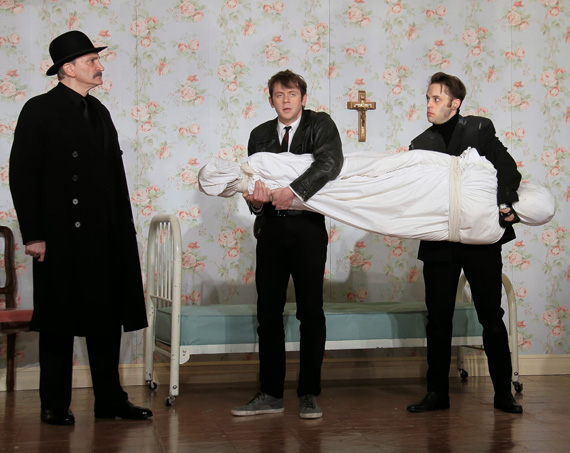Loot

(© Rahav Segev/Photopass.com)
Post-9/11 paranoia has turned a sizable portion of the population into Carrie Mathison, foiling nefarious criminal and terrorist plots at every airport gift shop and elementary school parking lot. Although he wrote in the 1960s, Joe Orton seemed to anticipate this hysteria with his dark comedy Loot, now receiving a revival at the Lucille Lortel Theatre. Red Bull Theater couldn’t have picked a better time, in light of the recent uproar over NSA surveillance programs whose secrecy and unaccountability is justified by “national security.”
Orton’s small canon of work has often been overshadowed by his tragic personal story: At the age of 34 he was bludgeoned to death by his boyfriend, right as his career was taking off. (He was in the process of writing a screenplay for the Beatles.) His story became the subject of the 1987 dark comedy Prick Up Your Ears, starring Gary Oldman and Alfred Molina.
Like the aforementioned film, Loot is a comedy, darkened by the looming presence of death. It takes place entirely in the downstairs parlor of an English row house, imagined in delicious detail by Narelle Sissons. The room has been transformed into a hospice: The sickly floral wallpaper is accented by green hospital curtains and plastic-covered armchairs. A large wooden coffin, adorned with flowers, occupies the center of the room. It contains the remains of Mrs. McLeavy. Her husband (simply called “McLeavy” and played by Jarlath Conroy) is a staunch Catholic. So is the late Mrs. McLeavy’s nurse, Fay (Rebecca Brooksher playing the archetypal 1960s sex-farce blonde, but with a nastier edge). Catholic morality has failed to make an impression on McLeavy’s son Hal (Nick Westrate, looking like a lost member of the Animals). Hal has robbed a bank with his best mate Dennis (Ryan Garbayo). The two plan to hide the money in Mrs. McLeavy’s coffin while stowing the corpse in a wardrobe. But when waterboard inspector Truscott (Rocco Sisto) comes snooping around, ostensibly to inspect the taps, their not-at-all-well-thought-out plan begins to unravel.
When Truscott informs Fay that the waterboard can arrest people under certain circumstances and she asks which ones, he replies, “I'm not prepared to reveal the inner secrets of the waterboard to a member of the general public.” Anyone who has boarded an airplane in the last 12 years or been patted down with the “back of the hand” will recognize Truscott as a stock character of 21st-century security theater: the unaccountable cowboy. He’s brilliantly written, walking the fine line between the ridiculous and the sincere.
As one would expect in a farce, there’s a lot of running through doors and hiding incriminating evidence in plain sight. Yet the natural pacing is not as manic, giving plenty of room for Orton’s considerable wit to breathe. “If I ever hear you accuse the police of using violence on a prisoner in custody again, I'll take you down to the station and beat the eyes out of your head,” Truscott threatens Dennis. Later on he rifles through a bookshelf, revealing clues as if he were in a community-theater production of Dial M for Murder, completely ignoring the stolen corpse sitting just a few feet away. What at first appears to be a zany farce is actually a stinging indictment of unaccountable authority and the blind trust we place in those who are allegedly keeping us safe. Orton’s lines offer a punchy laugh up front and a sour aftertaste that lingers.
Too bad Sisto garbles so many of those lines with his halting delivery that seems to have only two volumes: soft and shout. While the actor has plenty of moments of genuine clarity and spot-on comic timing, they’re too inconsistent for a role that carries the play’s funniest lines. Brooksher’s delivery is much cleaner, although all the performances are a little one-note and the accents all over the map. On top of that, director Jesse Berger’s choreographed blocking feels awkward and contrived.
Still, the text speaks for itself and mostly shines through the murky bits of this middling revival. You’ll laugh at the language, but mostly cringe at the amateurish acting.










